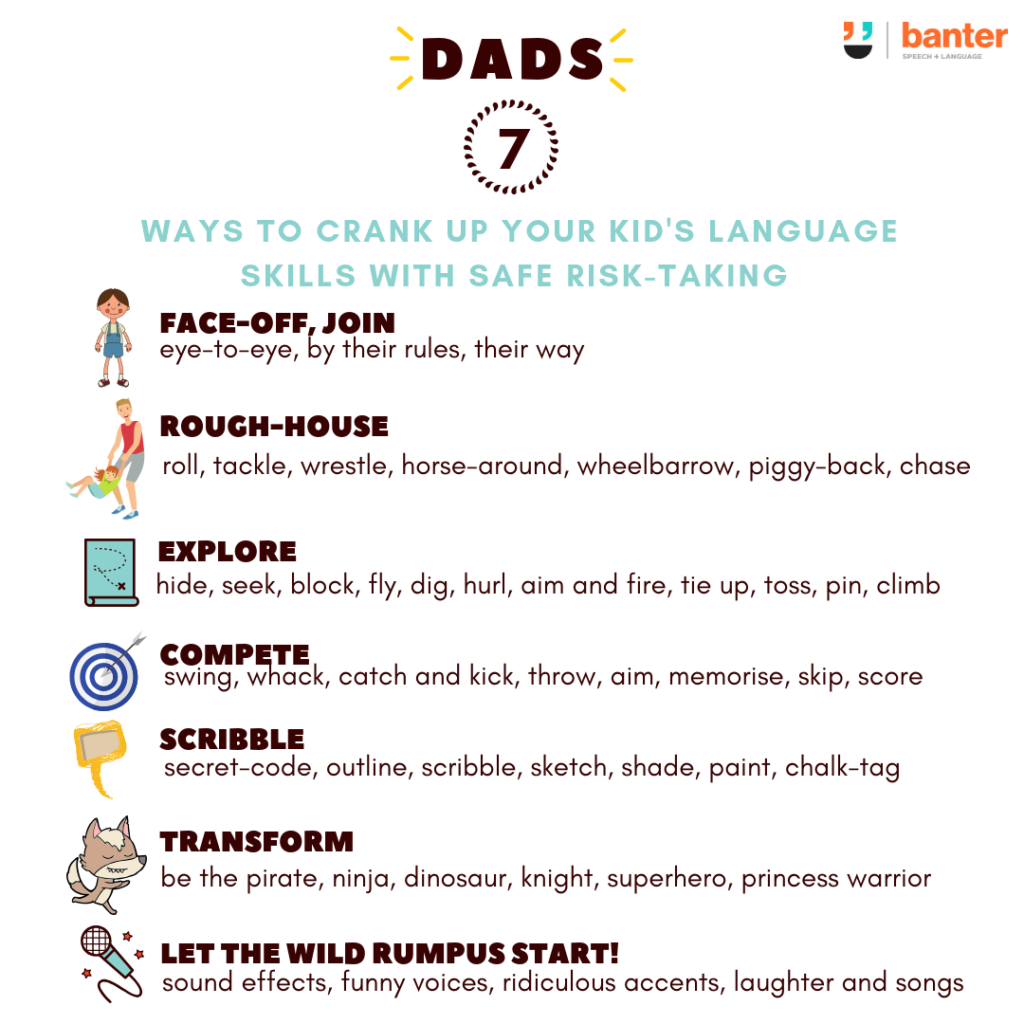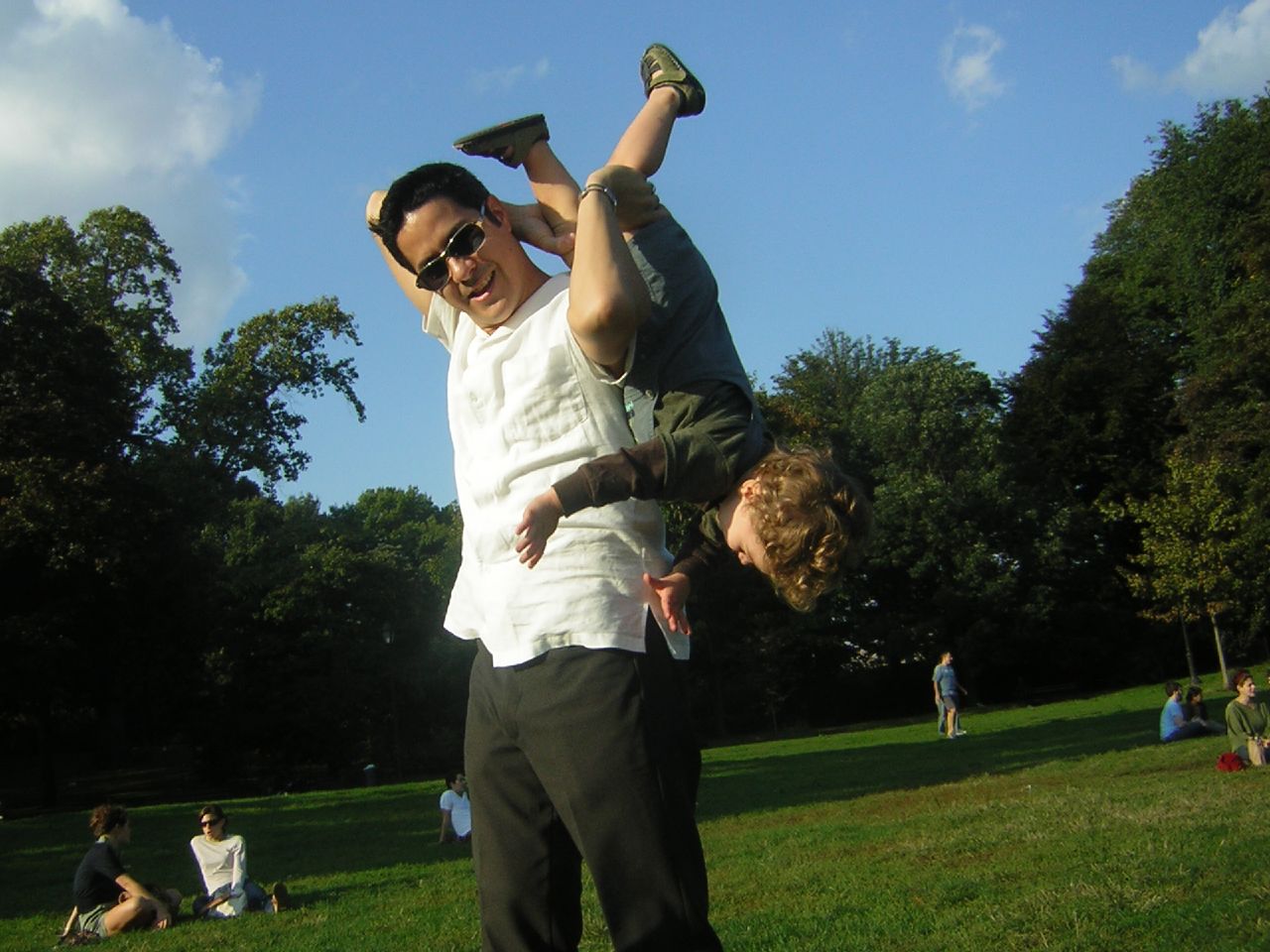Come on Dad! What we can do to help our kids’ language development
As my wife and sisters tell me from time-to-time: it’s not babysitting when it’s playing with your own kids!
I’m not going to lie, though. Lots of the research on kids and language development assumes Mum is doing most of the work. And, in many cases, it’s a fair assumption.
But it’s certainly not always the case. In the last couple of years, I’ve noticed a growing number of stay-at-home, work-from-home, working part-time, job-sharing, and single dads who more than hold their own when it comes to raising their kids. Even in families where dad works long hours away from home, and mum is the primary caregiver, there are hundreds of simple things dads can do to help, too. In this article, I’ll share my best examples.
Before we get into it, when I talk about “dads”, I mean anyone in a child’s life that is a father figure. It can be an older brother, uncle, cousin, granddad, mentor, neighbour – any young adult or adult male who’s important to the child.
Some of these tips and suggestions are particularly useful if your child has a language or developmental delay. But most apply to all kids and all dads.
So here are some suggestions:
1. Rough-housing
This includes:
- pretend fighting, e.g. superheroes v super villains, Kung Fu/Ninja masters, good v bad knights, Jedi Knights v Sith Lords, Teenage Mutant Ninja Turtles;
- physically picking up your child and/or flinging them about (e.g. playing horsy, wheelbarrow rides, piggy-back rides, “aeroplanes”, and spinning around/upside down games);
- play-wrestling;
- creeping-up games (e.g. What’s the Time, Mr Wolf?) and chasing games;
- jumping games, e.g. off tree stumps, into pools, down slip n’ slides, on trampolines; and
- water pistols and Nerf guns.
Some research says that physical play can encourage risk taking within a safe and secure environment (e.g. Bretherton et al., 2005). Other research says that dads can challenge the child, complementing the mother’s role in caring and comforting (Roggman et al., 2002). Dads (on average) have a more active play style, which has been linked to helping children to control their emotions, calm themselves down, refocus and wait for things patiently (Volling et al., 2002).
2. Pretend reading and writing games
Literacy development starts when children are exposed to printed text, books and writing at home (Strickland et al., 1990). Fathers can play a big role in getting their kids into words and books from a young age (e.g. Saracho, 2008).
Dads can help by:
- letting the kids see them enjoying reading (books, magazines, news on an iPad);
- “reading” picture books together – follow the child’s lead – no need to stick to the page order or printed words;
- working together on alphabet puzzles;
- making shopping lists together, e.g. circling things to buy in a hardware catalogue or brainstorming ideas for presents for Mum;
- engaging in pretend typing races;
- playing scribble games; and
- doing chalk-writing and drawing games, e.g. in the backyard.
3. Outdoor games that lend themselves to chatter/debate/hilarity:
- hide and seek;
- practising hitting balls off softball tees or with cricket bats;
- tag/chasing games;
- catch/kick games;
- acting out favourite apps (e.g. Clash of Clans), or trading card games (e.g. Pokemon, Yu-Gi-Oh!);
- quoits;
- frisbee play;
- kite-flying;
- digging in sandpits (e.g. for treasure);
- velcro darts;
- backyard bowling;
- family tug-o-wars;
- trench digging in the garden, including mud-pie tossing;
- toy bow and arrow hunting expeditions;
- pin-the-tail on the donkey;
- tree-climbing and fort making;
- hunting for worms, insects, frogs, etc;
- butterfly catching;
- making ant houses;
- attempting to hatch Sea Monkeys;
- “spying” games with binoculars;
- wild science experiments with slime and smoke and foul stenches;
- backyard camping nights in tents telling fairy tales and age-appropriate ‘ghost’ stories;
- making shelters and nests with sticks and leaves; and
- putting on plays for Mum in the backyard “theatre”.
4. Made up activities based on “active books”
Choose books that are age-appropriate but lend themselves to active play/games or active discussion. Can’t think of one to buy/borrow from the local library? Here are some suggestions, along with activity suggestions for each:
- Guess Whose Shadow: chase your shadows.
- Click, Clack, Moo: Cows That Type: pretend to type messages to each other.
- Don’t Let the Pigeon Drive the Bus!: make a bus out of a cardboard box.
- Dinosaur Roar!: bury dinosaur figures in the dirt/sand, then dig them up.
- Fire Truck: Make a truck. Use trucks to respond to emergencies around the house.
- Go Away, Big Green Monster: hide photos around the house and then find them.
- Who Sank the Boat? Make a boat and animals and act it out.
- Grandpa Green: Collect leaves and see if you can squeeze the green dye out.
- Walter the Farting Dog: add sound effects!
- Rudie Nudie: run around the backyard sans clothes!
- Tap Tap Bang Bang: get out some toy tools and bang things.
- Building with Dad: make a sand box.
- Not a Box: cut up big boxes and turn them into houses, tunnels, forts.
- Mr George Baker: make musical instruments out of spoons, tin cans, old milk jugs.
- (older kids) Treehouse series: draw your own treehouse.
Of course, you don’t actually need the book to do any of the above activities!
5. Secret and other “missions”
These types of games help kids learn about the world. Here’s some ideas (and some props you’ll need to find/make):
- emergency response units: clipboards, paper, pens, bandaids, cotton balls, gloves, paddle-pop sticks, toy stethoscope, toy people, toy vehicles;
- restaurant: clipboards, paper, pens, table, tablecloth, plates and cutlery, menus, apron, chef’s hat, food;
- woodwork: hammers, plywood, glue, buttons, nails, screws;
- construction: toy trucks/diggers, sand/dirt, shovels, blocks/rocks, shells, toy people/animals/dinosaurs;
- farming: toy animals, farm-house, “grass”, fences, toy tractors;
- office: keyboards/computers, pens, paper, stationery, staplers, hole punches;
- fishing: water, fish, fishing rods, boats, “sharks”, sea monsters;
- spies: torches, walkie-talkies, secret ink (aka lemon juice), morse code and semaphore charts;
- pirates: hats, flags, coins/treasure, hook-hands, planks (to walk), toy parrot/bird, eyepatch, cutlasses; and
- Holy Grail searches: armour, horses, swords, lances, “grails”.
6. Songs and silly voices
- You don’t need to be a good singer. Just ask my kids! (Although, secretly, I know I’m a good singer.)
- With younglings, go for songs with lots of repetition and that you can act out, e.g. Wheels on the Bus, Humpty Dumpty (falling off walls) or the Grand Old Duke of York (marching up to tops of hills and marching down again). For older kids, get them to teach you their favourite songs, even if they pretend they’re horrified by your interest.
- Don’t underestimate the comic effect of dad putting on a funny voice or ridiculous accent, especially for kids used to seeing a very serious/stressed dad going to and coming back from work during the week.
Some final language tips for dads when playing with their kids
- Get down to their level – look at them eye-to-eye, even if you have to squat down or lie on your stomach to look them in the eye.
- Follow what your kid does – not what you want to do or what you think is the “right way” of playing a game or reading a book. Start off by imitating their actions, sounds and words and/or wait for them to choose something to play with, then join in.
- Focus on things the child is interested in. Whether it’s trucks, dinosaurs, Octonauts, princesses, fairies, trains, Pokemon, superheroes, cooking or tools, kids are more likely to pay attention to things they are into.
- Make sure you talk about what you’re doing/what’s happening as you go.
- Cut down or avoid activities where your kid doesn’t need any input from you and/or where he/she is so immersed he/she stops talking, e.g. some kids with Lego or blocks. Reduce activities with no face-to-face interaction with another human, e.g. watching TV or playing Minecraft.
- As you act things out, use lots of specific verbs, e.g. lift, throw, catch, drop, hit, stir, grill, etc.

- Stockall, N. & Dennis, L. (2013). Fathers’ Role in Play: Enhancing Early Language and Literacy of Children with Developmental Delays. Early Childhood Education Journal, 41:299-306.
- Wild experiments at home.
Image: http://tinyurl.com/z26zquv

Hi there, I’m David Kinnane.
Principal Speech Pathologist, Banter Speech & Language
Our talented team of certified practising speech pathologists provide unhurried, personalised and evidence-based speech pathology care to children and adults in the Inner West of Sydney and beyond, both in our clinic and via telehealth.








